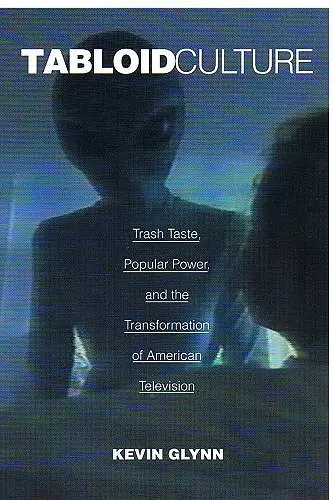Tabloid Culture
Trash Taste, Popular Power, and the Transformation of American Television
Format:Hardback
Publisher:Duke University Press
Currently unavailable, and unfortunately no date known when it will be back

An examination of the rise of tabloid television and the political, cultural, and technological changes that have enabled its success.
Focuses on diverse theoretical sources and an unprecedented range of electronic and print media in order to analyse important aspects and key debates that have emerged around this phenomenon. Rejecting elitist dismissal of sensationalist media, this book traces the cultural currents and counter currents running through their forms and products.During the latter half of the 1980s and throughout the 1990s, television talk shows, infotainment news, and screaming supermarket headlines became ubiquitous in America as the “tabloidization” of the nation’s media took hold. In Tabloid Culture Kevin Glynn draws on diverse theoretical sources and an unprecedented range of electronic and print media in order to analyze important aspects and key debates that have emerged around this phenomenon.
Glynn begins by situating these media shifts within the context of Reaganism, which gave rise to distinctive ideological currents in society and led the socially and economically disenfranchised to access new forms of information via the exploding television industry. He then tackles specific daytime talk shows and tabloid newscasts such as Jerry Springer and A Current Affair, reality-TV programs such as Cops and America’s Most Wanted, and two different supermarket tabloids’ coverage of the O.J. Simpson case. Tabloid Culture is the first book to treat these diverse yet related media forms and events in tandem. Rejecting the elitist dismissal of sensationalist media, Glynn instead traces the cultural currents and countercurrents running through their forms and products. Locating both reactionary and oppositional meanings in these texts, he demonstrates how these particular media genres draw on and contribute to important cultural struggles over the meanings of race, sexuality, gender, class, “normality,” “truth,” and “reality.” The study ends by discussing how the growing use of the Internet provides an entirely new realm in which such material can circulate, distort, inform, and flourish.
This innovative and provocative study of contemporary mainstream media culture in the United States will be valuable to those interested in both print and television media, the cultural-political influence of the Reagan era, and American culture in general.
“At last, a book that treats tabloidism seriously! Glynn’s multidimensional study— analytical, historical and theoretical—shows us how tabloid TV became the genre that reshaped the media environment of the 1980s and 1990s. Glynn’s treatment of the phenomenon itself and of the controversies around it provide insights into contemporary media culture that we cannot ignore. No one who is interested in how changing notions of popular culture shape both the commercial and textual forms of contemporary media can afford to miss this book.”—John Fiske, author of Media Matters: Everyday Culture and Political Change
“This is a very smart book about aspects of contemporary media culture that have never been more visible nor more in need of rigorous analysis. Glynn goes beyond the simplistic demonization of tabloid television to specify both the genre’s form and its cultural ramifications.”—Jim Collins, author of Architectures of Excess: Cultural Life in the Age of Information
ISBN: 9780822325505
Dimensions: unknown
Weight: unknown
336 pages